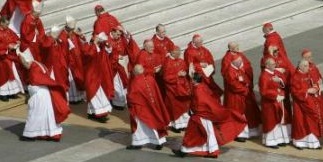By Sandro Magister
Chiesa
October 22, 2010
http://chiesa.espresso.repubblica.it/articolo/1345246?eng=y
 |
On the vigil of the Sunday of Christ the King, the end of the liturgical year, the Catholic Church will have 24 new cardinals. Benedict XVI announced the names at the end of the general audience on Wednesday, October 20, in Saint Peter's Square.
Most of the appointments are expected, and some of them practically obligatory, as demonstrated in the newspaper of the Italian bishops, "Avvenire," by one of the most incisive analysts of Vatican affairs, Gianni Cardinale, in the two commentaries reproduced further below.
But some of the appointments announced show original features, distinctive of the current pontiff.
The first is Benedict XVI's desire to keep the number of cardinal electors, the ones who have the right to vote in conclave, under 120. With the consequence of restricting the number of those who aspire to and attain the purple. For example, it is no longer the practice to make cardinals of the nuncios of the most prestigious sees: Paris, Vienna, Lisbon, Madrid, Berlin, Washington.
A second characteristic feature of the current pontificate is the rule of not making a cardinal of an archbishop whose predecessor is still alive and under the age of 80. This unwritten rule was adopted for the first time at the consistory of 2007, with just one exception for the archbishop of Genoa, Angelo Bagnasco, who was made a cardinal even though his predecessor, Tarcisio Bertone, who had become the Vatican secretary of state, was 73 at the time. This time, there haven't been any exceptions. And so, with regard to Italy, there has been no purple for the archbishop of Florence, Giuseppe Betori, or of Turin, Cesare Nosiglia, two cities that along with Milan, Venice, Bologna, Genoa, Naples, and Palermo (plus Rome, with the pope's vicar) are traditionally headed by cardinals.
A third new and unprecedented element of the next concistory is the promotion as cardinals not of the archbishops in office in their respective dioceses, but of their predecessors "emeritus." This has been done with the retired archbishops of Quito and Lusaka.
Finally, it was certainly Benedict XVI himself who chose the four new cardinals over the age of 80, nominated "ad honorem."
It was Paul VI, in 1970, who prohibited those over the age of 80 from voting in conclave. But in the three following consistories he did not make any cardinals older than 80. The first appointments of this kind were by John Paul II in 1983, when those made cardinals included the Jesuit theologian Henri De Lubac. Pope Karol Wojtyla made a total of twenty-two cardinals over the age of 80. Benedict XVI has already made twelve of them.
One of the four new cardinals "ad honorem" of the next consistory will be Domenico Bartolucci, remarkably robust at 93, previously the "perpetual" director of the Sistine Chapel choir that accompanies the pope's liturgies.
Benedict's conferral of the purple on him looks like an unambiguous rehabilitation of this preeminent maestro of Gregorian and polyphonic liturgical music, treacherously expelled from the direction of the Sistine choir in 1997 by the directors of pontifical ceremonies at the time.
What a shame that since then, without him, the choir of the Sistine Chapel has fallen to abysmal levels. Nor is there any reason to hope for a worthy rebirth in the appointment as its director, a few days ago, of Salesian Fr. Massimo Palombell, a protege of the cardinal secretary of state.
Next Monday, October 25, in the academic hall of the Pontifical Institute of Sacred Music in Piazza Sant'Agostino in Rome, maestro Bartolucci will also receive an award from the Fondazione pro Musica e Arte Sacra, together with Benedict XVI's brother, Georg Ratzinger, another great proponent of liturgical music.
And it will be as if the purple given to the former is also honoring the latter. Something not entirely bizarre, if one remembers that Leo XIII, at his first consistory in 1879, made a cardinal of his brother Giuseppe Pecci, a Jesuit and the deputy librarian of the Vatican library.
Any original material on these pages is copyright © BishopAccountability.org 2004. Reproduce freely with attribution.